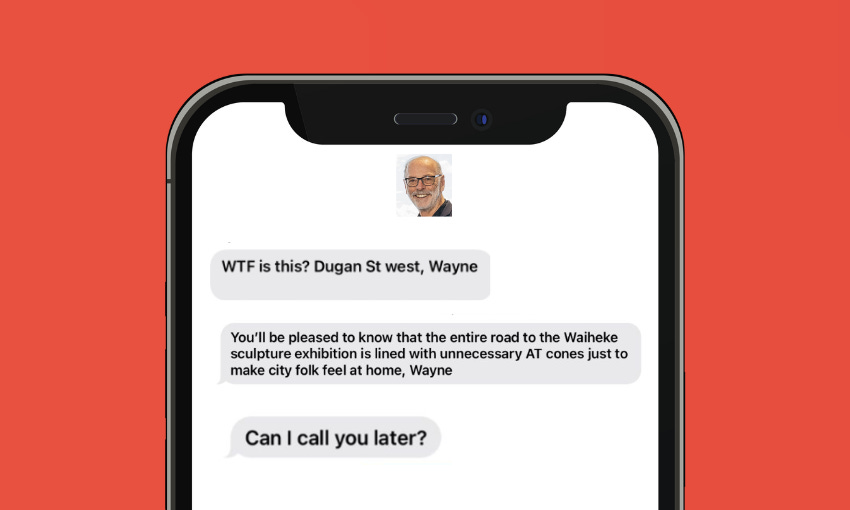China rifles through our digital drawers
Accusations that China-backed hackers accessed MPs' data came as the UK and US made allegations of their own – and even issued arrest warrants.
Mōrena, and welcome to The Bulletin for Wednesday, March 27, written by Catherine McGregor.
In today’s edition: How New Zealand’s infrastructure got so bad; Disability minister to handover financial reins after scathing response to support cuts; Debt-laden Kāinga Ora cancels construction of hundreds of new homes. But first, Chinese cyber espionage reached inside the walls of parliament, the GCSB says. How should New Zealand respond?
Chinese hackers accessed MPs’ data
Chinese state-sponsored cyber-spies targeted New Zealand's parliament in 2021, accessing data on MPs, GCSB minister Judith Collins revealed on Tuesday. The hack has been identified as the work of Advanced Persistent Threat (APT) 40, a group allegedly linked to China’s Ministry of State Security. Collins said NZ’s Parliamentary Counsel Office and the Parliamentary Service were targeted, and while the accessed data wasn't strategically sensitive, the incident underscores the threat to cybersecurity posed by hostile foreign actors. It’s not the first such incident. “In 2021, former GCSB Minister Andrew Little condemned the Chinese Ministry of State Security for its malicious cyber activity, in a separate incident to the revelations from Collins today,” the Herald reports. “APT 40, the same group named today, was said to be responsible for the incident.” Then, just six months ago, a SIS threat assessment warned about “ongoing activity in and against New Zealand and our home region that is linked to the [China’s] intelligence services”.
A diplomatic minefield for Luxon
China has denied the most recent allegations. The embassy said NZ was “barking up the wrong tree”, and suggested it was influenced by similar claims made recently by the US and UK. While key ministers condemned China’s actions yesterday, they didn’t speak as strongly as they could have, writes BusinessDesk’s Pattrick Smellie (paywalled). It “spoke volumes” about how NZ seeks to straddle its trading relationship with China and the growing need to push back on Chinese intelligence and influence campaigns, he says. In the Herald (paywalled), Audrey Young says PM Chris Luxon judged the response perfectly. “It required delicate diplomacy and he delivered.” The Post’s Luke Malpass calls the government’s decision to go public “brave and risky”, noting it could have decided to stay quiet about the attack instead. Stuff’s Tova O’Brien, on the other hand, thinks it shows up our “co-dependence” on our allies. “Two and half years it sat on this information that China had attacked our democracy. And it only chose to go public after the United States and United Kingdom had gone first… Coincidence? No.”
Election candidates targeted by foreign actors
Coincidentally enough, yesterday also saw the annual select committee appearance by the heads of NZ’s two spy agencies, the GCSB and SIS. Incidents of foreign interference discussed by the spy chiefs included "deceptive, covert, corruptive" actions by state actors attempting to influence candidates in last year’s election, Stuff’s Glenn McConnell reports. SIS boss Andrew Hampton said in some cases the SIS had worked with candidates to help them become aware of these interference attempts, and it was “highly unlikely” that the election result had been impacted in any way. He also said the SIS had discovered that seven NZ pilots had been involved in training Chinese army aviators. “Such activity clearly poses a major national security risk and it is not in New Zealand’s interests to have former military personnel training another military who does not share the same values as our own.”
UK and US impose sanctions, make arrests over own hacking claims
The revelations about espionage inside the NZ parliament came just hours after the UK and US imposed sanctions against a Chinese company linked to the hacking group nicknamed APT 31 (the Guardian explains the APT naming convention is used by Western security officials to identify hacking groups linked to foreign governments). The UK alleges that Chinese state-sanctioned hackers targeted the Electoral Commission, potentially gaining access to information on tens of millions of UK voters, and conducted cyber “reconnaissance activity” against British parliamentarians who were critical of Beijing in 2021. Meanwhile the US government accused China of perpetrating an elaborate state-backed hacking programme for more than a decade, and charged six hackers with conspiracy to commit computer intrusions and wire fraud as a result.
Meet the professor at the helm of one of New Zealand's most renowned studies
In 1972, the participants of one of the world's landmark longitudinal studies: the Dunedin Study, were born. This year, under the new leadership of professor Moana Theodore, the study enters a new phase in its 52nd year.
Theodore spoke to The Spinoff about her history with the study, and big hopes for its future impact.
Read the full story on The Spinoff now, in partnership with the University of Otago. (sponsored)
How New Zealand’s infrastructure got so bad
New Zealand gets less built than other countries with the same level of per capita infrastructure spending. That’s one of the takeaways from Susan Edmunds’ Stuff feature this morning on what’s gone wrong with our infrastructure and why it’s so expensive to fix it. One of the reasons for the gap, according to urban planning expert Timothy Welch, is politicians’ keenesss to be seen to be building more and more new projects, often tending to neglect the maintenance as a result. Infrastructure NZ boss Nick Leggett says we’ve “got to get better at making calls about what’s important for the country”. He points to the hundreds of millions of dollars spent on preparatory work for projectes and “we have nothing to show for it because the project gets cancelled then we’re back again in 10 years’ time”. He says there needs to be political agreement on infrastructure projects that aren’t “red or blue but are just for the benefit of the country”. The special report also includes op-eds by Leggett and Auckland mayor Wayne Brown.
Disability minister to handover financial reins after scathing response to support cuts
Cabinet will have final say on any further changes to disability funding after an unexpected announcement of modifications to support services caused uproar in the disability community and drew criticism from across the political spectrum. Those changes will remain, however, “despite a top-up in funding to ensure the ministry can continue funding services through to the end of the year”, RNZ reports. Labour leader Chris Hipkins says mandating Cabinet oversight was a "massive vote of no confidence" in Penny Simmonds, the disability minister. “I would actually expect if the prime minister has that little confidence in a minister that he would do something more than that." But PM Chris Luxon says Simmonds is “doing a great job – she came out, declared it could have been done better, and it should have been handled better and it wasn't, and she's apologised for it."
Right now, we need your support more than ever
The Spinoff has estimated that the number of full-time journalists in New Zealand may have halved since 2018 Census data was published. As the media landscape continues to change, The Spinoff is not immune to the drastic advertising slowdown impacting the viability of media in this country. To those who already support us, thank you. If you don’t and are able, we’d be very grateful if you’d consider becoming a Spinoff member or donating today.
Duncan Greive
Founder
Click and Collect
Debt-laden Kāinga Ora has cancelled construction of about 500 new homes and the future of another 1500 is in the balance, a Newsroom investigation reveals.
New Zealand is still importing egg products – such as liquid eggs – from battery-hen chickens, despite our own local ban.
A Destiny Church protest that included painting over a rainbow crossing failed to stop Gisborne Library’s Rainbow Storytime drag queen event, but Hastings and Rotorua have cancelled theirs.
David Seymour has videoed himself reciting a poem he authored for World Poetry Day. You have been warned.
Six people remain missing after the massive bridge collapse in Baltimore last night.
Feeling clever? Click here to play 1Q, Aotearoa’s newest, shortest daily quiz.
Hayden Donnell has Wayne Brown’s texts to the boss of AT – and they’re exactly what you’d expect. Public submissions to the Covid inquiry closed on Sunday. Stewart Sowman-Lund explains what happens next. Leni Ma’ia’i has an out-of-the-box idea for funding journalism: make PR professionals pay for it. The latest Cost of Being submission is from a “lavish but weirdly sensible” landlord who’s raising a teen. Last weekend’s CubaDupa festival was a glimpse at the future of Wellington, says Preyanka Gothanayagi.
Sporting snippets
Growing calls for NZ Cricket to cancel its men’s tour of Afghanistan over women’s rights concerns.
All Whites vs Tunisia kicks off in just over 90 minutes’ time.
The Bulletin is looking for a sponsor
Expertly curated, The Bulletin delivers essential news and diverse perspectives from Aotearoa and beyond to business leaders, politicians, and decision-makers nationwide. Contact commercial@thespinoff.co.nz to learn more.
Got some feedback about The Bulletin, or anything in the news? Get in touch with me at thebulletin@thespinoff.co.nz.
If you liked what you read today, share The Bulletin with friends, family and colleagues.











Can we have more content on Ukraine please
Be good to get a sense as to whether this Chinese hacking is unique to that country or whether it is just standard behaviour of most countries.
If the later, then to what extent is Minister Collins releasing this story of Chinese hacking part of softening us up for joining AUKUS?
Did the Select Committee ask many questions about the GCSB forgetting to tell the government of the day about it undertaking spying for other countries?